News
The Price of Identity
Wednesday, August 7, 2019

The River Barrow, Athy, Kildare, IRE
I grew up thinking I knew what it meant to be Irish. But what I knew was what it meant to be Irish American Catholic. As opposed to Italian American Catholic, or Polish American Catholic. I understood how the families of my friends at St. Peter’s parochial school all honored different saints and celebrated various holidays differently. But it was not until 2007 when I first went to Ireland myself that I began to understand the vast difference between being historically ethnically Irish, and being Irish in a modern context.
And while I am a dual citizen, and grateful to be so, I am clear when I visit Ireland that I am in every way from Estados Unidos. I am an American. I am almost equally French Canadian as I am Irish. So, I can in fact say in an inclusive way that I am an American. The Jencks side have been in the US since the time of the colonies, since the early 1700s. Near as we can tell, they were Welsh and English. The first colonial governor of Rohde Island was Joseph Jencks (he says with pride). A distant cousin for sure, but nearly untraceable after so many generations. He did well in the business of casting and forging tools and implements, fine metal castings and other forms of metallurgy. But my branch of the Jencks family, well we have always been wanderers. Every generation picking up and moving on to somewhere, with the hope that it would be better. From Rhode Island to Ohio, to Wisconsin and North Dakota, and on to Washington state and California. We are a peripatetic lot.
And while it is good to know that I come by my wandering and explorative nature honestly, I was delighted to realize that my kin have more than 250 years of history in one small town in County Kildare, Ireland. Athy. And that identity of being from Athy means something in Ireland. When people ask where my people are from and I say Athy, (not far from where Luka Bloom is from BTW) that means something. Being connected to a place means something. Not just there, but anywhere. On my Dad’s side, one branch has been in Minnesota for 4 generations now. But not for two and a half centuries. And that’s just the records we’ve found so far. My ancestors were likely in that valley in Ireland for generations before that. They were Murphy’s and Kilbride's. Both ancient names in the region. The Dominicans started the first church in Athy in 1257. Wow.
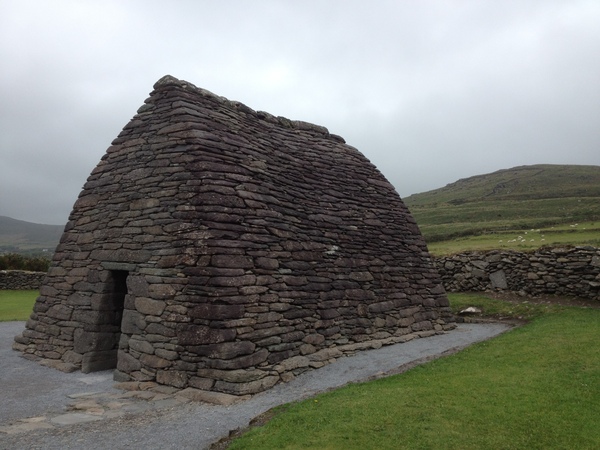
The Gallarus Oratory on the Dingle Peninsula
It has always been a curiosity to me that with French Canadian, Alsatian, Welsh, English, Scottish, German, and a small fraction of Native American heritage – it is the Irish heritage that has so thoroughly dominated my awareness of my identity. But there it is.
This year my sister Julie and I did some exploring in my Granddad Felix Kilbride’s homeland, County Kildare. We had a grand adventure meeting cousins, walking the streets he would have walked. We went to the town museum and met with a local historian and genealogy expert. They confirmed some things we suspected and filled in many gaps. The family were Tailors going back many generations. They were native Irish Language speakers, fluent and literate in Irish and English going back several generations.
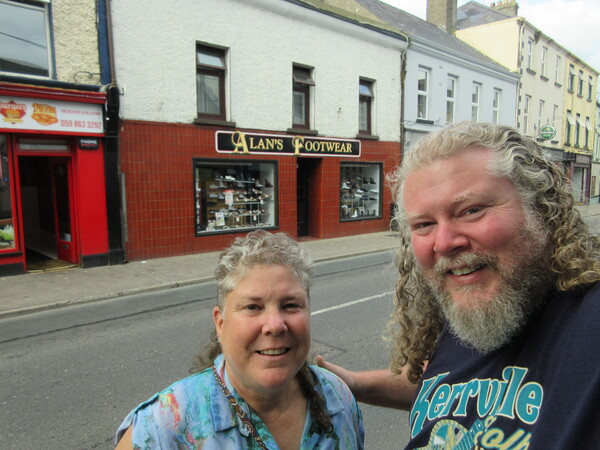
Julie and I in Athy - in the background - what was once the Kilbride Tailor Shop. Now Alan's Footwear.
In 1911 Great Granddad Felix Kilbride WAS sentenced to a few months in prison. I was worried that this would be a black mark on the family name. Maybe that was why they left? NOPE. It was a Tax Protest. They were ethnic Irish paying taxes to the British Crown and so they cooked the books as a way to support the independence movement. In short Great Granddad Kilbride was an Irish patriot and a political prisoner. Both the historian and the genealogy expert were ready to buy us pints just for that. Far from being a black mark, they read it as a badge of honor. Good to know I come by my renegade nature honestly as well.
I grew up singing Irish songs, hearing Irish stories, and celebrating Irish Saints. My favorite holiday Samhain, Halloween derives from a pre-Christian Irish celebration of the harvest and the beginning of winter. A night when the veil between this world and the next world is thin and spirits can back cross over. So, turnips and other bulbous root vegetables were carved with scary faces and often a candle would be put inside to chase away the dark spirits. Only the good spirits would be drawn to the light. And this tradition is so VERY much like DI de Los Muertos – the Mexican Day of The Dead – it blows my mind. How many other earlier human societies celebrated some parallel honoring of the ancestors and festival that makes us intentionally aware of our mortality?
I first made it to Ireland in 2007, because I met a man named Tom Pigott. We met at a Folk Alliance conference. He found out I was an Irish Citizen who had never been to Ireland, and that was that. He insisted that I visit before the year was through. In fact, he swore an oath on his own life that he would make it happen. And he did. We did it together. And I have been going back since. Tom sadly passed in 2012, but his spirit lives! And I am grateful to all the folks with Inishfree Tours who picked up Tom’s legacy and kept it going.
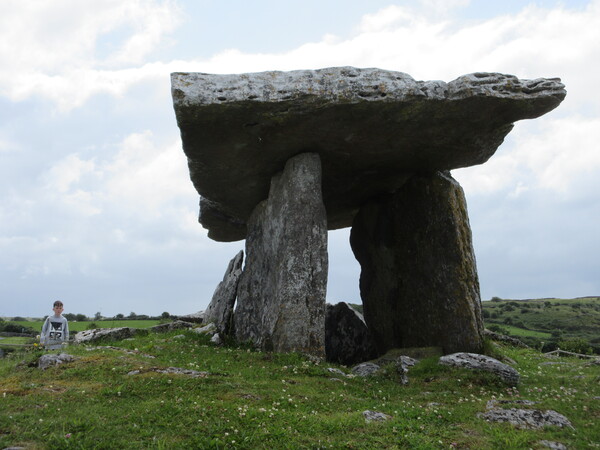
Poulnabrone Dolmen Toumb in the Burren
My mom’s maiden name, Kilbride, means Church of Bridgette in English, or church of Bridgid as the Irish would say. But in the Irish Language, Irish Gaelic in which I am not qualified to spell at present, it is McGillabridgh or something like that. I’ll get back to you. But many historians understand this surname to be derived from the Goddess Bridh, and they also argue about the spelling of that name. Regardless, they were the keepers of the temples to the goddess, and identified as the clan of Bridh. I met an old man in a pub in Doolin once and he asked about the family surname. I said Jencks. He said, the other one! Apparently, I can’t hide my Irish even there. I said Kilbride, and he instantly rose and shook my hand and said, servants of the Goddess. Be proud of that name. There are very few of you left.
I am proud of the names, and the identities. I am delighted to know my people were native Irish speakers once. I was honored to have a few pints in a pub where my people surely would have gathered. O’Brien Pub in Athy. It was a small town and that place has been there the better part of two centuries. Surely, they were there. A marvelous feeling. And so grateful to have shared the journey with my sister. We marveled and how much Athy and County Kildare looked like northern Illinois and eastern Michigan where the Kilbride people settled in the US. It must have just looked and felt like home to them. Until winter arrived. But they coped. They always did.
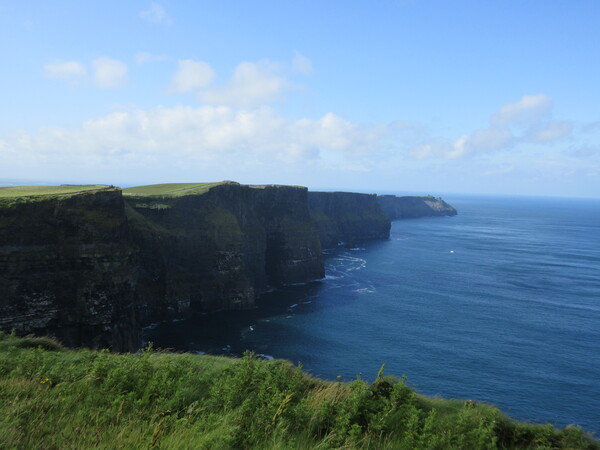
The Cliffs of Moher
But as we see the news, read the papers, and wrap our heads around what darkness people are willing to perpetrate on each other in the name of racial and ethnic identity, I am aghast. I am baffled and shocked. And I wonder about how much pride one should take in ethnic identity? To the extent that it helps us live better lives, feel more grounded and connected to our people, I suppose it’s a good thing. But as we have clearly seen, racism is alive and thriving in ways unimaginable to those of us who grew up in the wake of the Civil Rights Movement. We were privileged to grow up thinking that level of hatred was waning.
Yesterday was the remembrance of Hiroshima. Tomorrow the reembrace of Nagasaki. At no time in history has any nation killed more people all at once that the USA did on those fateful days in 1945. And while I am a student of history, and I understand all of the reasons and arguments that have been made to me about why the use of The Bomb was considered necessary, I also see ethnic identity and racism playing into that decision. And it simply must stop.
The color of one’s skin or the county of one’s origin must cease to be a cause for violence and murder. Whether in wars between nations or on the streets of our cities and towns, or on our national borders, we must transcend ethnicity and race as the justification for violence. I believe in the rule of law, but not of unjust laws. And tyranny by any name is still tyranny. My Irish, Quebecoise, Alsatian, and indigenous ancestors would all agree. I don’t know how we transform this world, but I am so clear about the absolute and irrefutable need for all of us to become peacemakers in every possible way. And I will keep seeking the path along with you.
In Gratitude and Song,
Joe
8-7-19
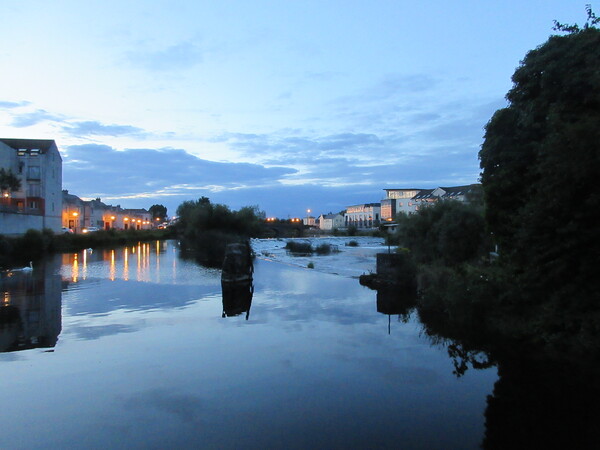
Sunset in Carlow